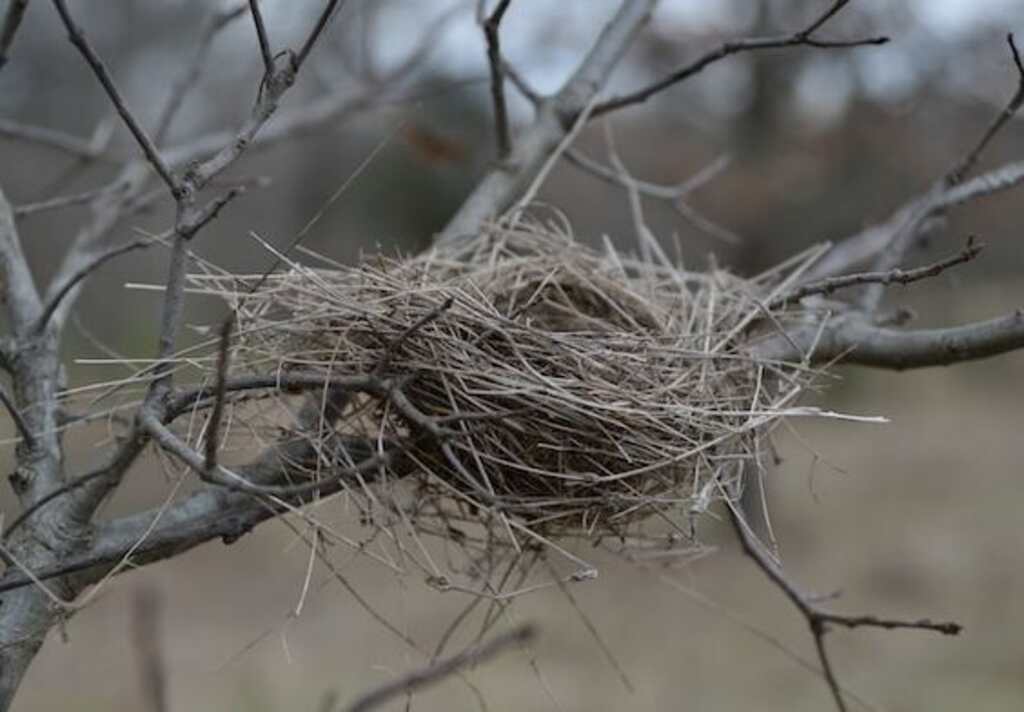Have you ever noticed the intricate nests that birds build? These structures, made from a variety of materials such as grass, twigs, and mud, are not only impressive feats of engineering but also critical for the survival of many bird species.
From providing a safe place to lay eggs to sheltering young chicks from predators and harsh weather conditions, bird nests serve an essential role in the life cycle of these creatures. Bird nesting habits vary greatly among different species.
Some birds build nests on the ground, while others prefer to nest high up in trees or cliffs. The size and shape of nests can also vary depending on the species, with some birds creating elaborate structures that take weeks or even months to construct.
In addition to their practical use for raising young, bird nests have cultural significance too. In many cultures around the world, bird nests have been used for medicinal purposes or are considered a delicacy in culinary dishes.
Despite their importance and cultural significance, bird nests are threatened by various human activities such as habitat destruction and climate change.
Understanding why birds abandon their nests and how we can protect them is critical for preserving these beautiful creatures.
Table of Contents
- 1 Overview: Do Birds Abandon Their Nests?
- 2 Reasons why birds abandon their nests
- 3 Types of birds that commonly abandon their nests
- 4 Nest Abandonment and its Effects on Bird Populations
- 5 Protecting Bird Nests: Strategies to Prevent Abandonment
- 6 Examples of Successful Nest Protection Efforts
- 7 Conclusion
- 8 FAQs: Why Birds Abandon Their Nests?
- 8.1 Why do birds abandon their nests?
- 8.2 What are the main predators of bird nests?
- 8.3 Can human activity cause birds to abandon their nests?
- 8.4 Do birds abandon their nests if touched by humans?
- 8.5 Do birds return to abandoned nests?
- 8.6 What is nest parasitism, and how does it affect nest abandonment?
- 8.7 Can birds abandon their nests due to weather conditions?
- 8.8 Why do some birds abandon their nests after laying eggs?
- 8.9 Do all bird species abandon their nests?
- 8.10 What should I do if I find an abandoned bird nest?
- 9 Author
Overview: Do Birds Abandon Their Nests?
The question of whether birds abandon their nests is one that has fascinated scientists for years. Nest abandonment can occur due to natural causes such as predators, disease or harsh weather conditions.
However, human interference is often cited as one of the primary reasons why birds abandon their nests.
Some researchers estimate that up to 90% of nest failures are caused by human activities such as habitat destruction or disturbance.
For example, construction projects near nesting areas can cause adult birds to flee out of fear or change nesting locations altogether.
The implications of nest abandonment extend beyond just individual birds and can impact entire populations as well as ecosystem functioning.
Without successful reproduction cycles due to abandoned nests each year, populations could decline drastically.
This highlights the importance of understanding why birds abandon their nests and implementing measures to protect them.
In the following sections, we will discuss the reasons for nest abandonment, explore which bird species are most likely to abandon their nests, and examine strategies that can be used to reduce nest abandonment rates.
By understanding these factors, we can take steps to preserve bird habitats and ensure that these fascinating creatures continue to thrive for generations to come.
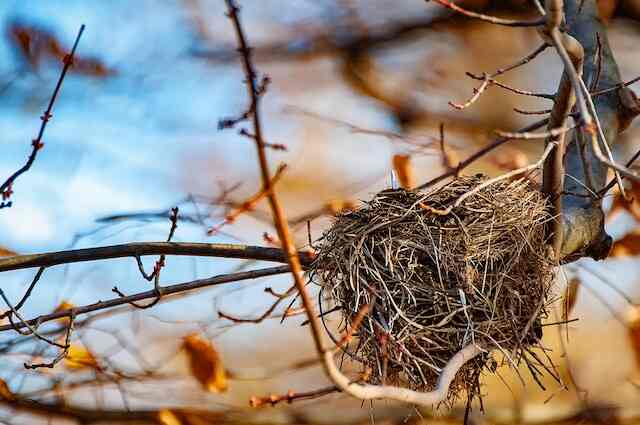
Reasons why birds abandon their nests
Birds dedicate a lot of time and energy to building and maintaining their nests. Therefore, it is not common for birds to abandon their nests unless they are left with no other choice.
Nest abandonment can occur due to several reasons, including natural causes such as predators, weather, and diseases, as well as human interference such as habitat destruction or disturbance.
Natural causes – Predators
Predators are one of the main reasons why birds may abandon their nests. Eggs and chicks are an easy target for predators like snakes, raccoons, and cats. If a predator discovers an active nest, they will often return repeatedly to prey on the contents.
Birds may choose to abandon the nest if they sense that it is unsafe due to predator activity. Another natural cause of nest abandonment is weather conditions.
Heavy rain or wind can damage or destroy a nest structure, causing eggs or chicks to be exposed and at risk of being injured or killed in bad weather conditions.
In some cases, too much heat can make it unbearable for birds to stay in the nest, leading them out temporarily.
Natural causes – Diseases
Diseases can also cause nest abandonment in birds if they lead to sickness within the colony causing death rates among adults being high resulting into young ones not being able cared for.
Human Interference – Habitat destruction
The destruction of habitats caused by humans is one of the biggest problems that bird populations face today.
Human activities like deforestation can result in loss of nesting sites leading to displacement which ultimately results into abandoning their nests because finding another suitable nesting location would be difficult.
Human Interference – Disturbance
Disturbance from human beings who visit bird nesting areas can lead to birds abandoning their nests. This is particularly true for ground-nesting birds, who may abandon their nests if they feel threatened by nearby human activity.
Birds perceive humans as predators, so when humans enter a nesting area, the birds may be afraid to come back for fear of being attacked.
While nest abandonment is not common among birds, it can occur due to natural causes such as predators and disease or human interference such as habitat destruction or disturbance.
Understanding the reasons why birds may abandon their nests can help us take steps to better protect them and ensure that they are able to thrive in their natural habitats.
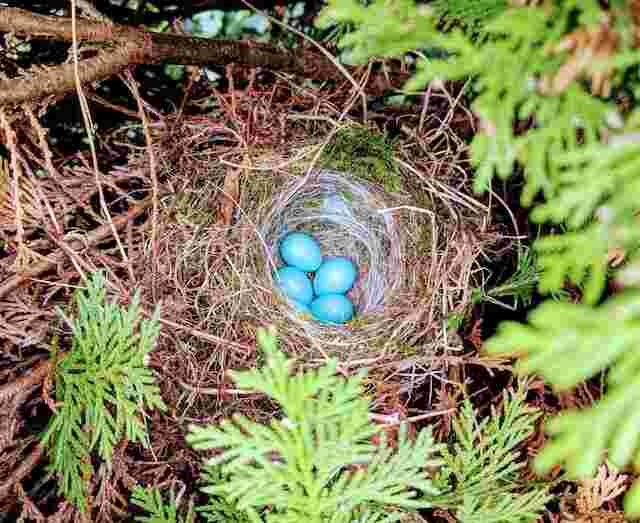
Types of birds that commonly abandon their nests
Birds come in all shapes and sizes, and their nesting habits can vary greatly. Some birds build elaborate nests high up in trees, while others create simple ground-scrapes in the dirt.
There are also many species of bird that are known to abandon their nests for various reasons.
Understanding which types of birds commonly abandon their nests can provide valuable insights into how we can better protect these species.
Ground-nesting birds vs tree-nesting birds
Ground-nesting birds, as the name suggests, build their nests on the ground. They often use natural materials such as grasses and twigs to construct a shallow depression in soil or leaf litter.
Examples of common ground-nesting bird species include quail, pheasants, and shorebirds. Tree-nesting birds build their nests high up in trees using a variety of materials such as twigs, grasses, and feathers.
These nest structures can range from simple platforms to complex domed structures complete with an entrance tunnel. Examples of common tree-nesting bird species include woodpeckers, nuthatches, and songbirds.
Species-specific tendencies
It’s important to note that not all ground-nesting or tree-nesting bird species are prone to abandoning their nests. Species-specific tendencies play a large role in determining which types of birds will abandon their nests and when.
For example, some species such as the American Robin may abandon eggs or chicks if they perceive a threat from predators or humans too close to their nest site.
Other species like Mourning Doves may simply lay new eggs if they lose an initial clutch due to predation or environmental factors.
Additionally, certain migratory bird species have been known to abandon nest sites under specific conditions during migration seasons when food sources are scarce or weather changes rapidly.
The effects of nest abandonment on bird populations
The abandonment of nests can have significant effects on bird populations. When a nest is abandoned, eggs or young chicks are left vulnerable to predators and environmental factors.
This can reduce the reproductive success of a particular species and ultimately impact population numbers.
Furthermore, the loss of nesting habitat due to human activities such as development or agriculture can exacerbate the issue by reducing available nesting sites for birds.
Protecting nest sites and minimizing human interference in natural areas is crucial for maintaining healthy bird populations.
Conclusion
Understanding which types of birds commonly abandon their nests, the reasons behind it, and how it impacts their populations is crucial for effective conservation efforts.
By identifying specific species at risk for nest abandonment, researchers and conservation organizations can work to protect habitats and reduce threats to these vulnerable birds.
Ultimately, preserving healthy bird populations will benefit not only species-specific ecosystems but also our larger environment as well.
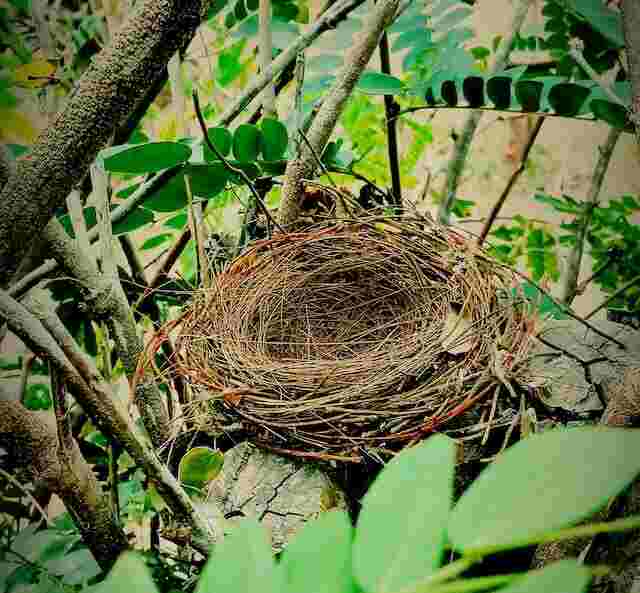
Nest Abandonment and its Effects on Bird Populations
Nest abandonment is a serious issue that affects bird populations across the world. When birds abandon their nests, it can have significant impacts on their reproductive success and the functioning of ecosystems.
This is especially true for species that are already facing threats such as habitat loss or climate change.
Decreased Reproductive Success
One of the most immediate impacts of nest abandonment is a decrease in reproductive success for affected bird populations.
When birds abandon their nests, eggs may not be able to hatch, or chicks may be left vulnerable to predators or harsh weather conditions.
As a result, bird populations may decline over time if nest abandonment rates become too high.
For example, studies have shown that increased human disturbance can lead to higher rates of nest abandonment in some species of ground-nesting birds, such as Killdeer and Piping Plovers.
This disturbance can be caused by dogs running loose on beaches, ATV use near nesting sites, or people walking too close to nests or flushing birds out.
Impact on Ecosystem Functioning
Birds play important roles in many ecosystems, from pollinating plants to controlling insect populations. When bird populations decline due to nest abandonment, these ecosystem functions can be disrupted.
For example, some songbirds play an important role in controlling forest pest outbreaks by eating insect larvae.
If these songbirds were to experience high rates of nest abandonment due to factors such as habitat fragmentation or predation by cats and other animals, this could lead to an increase in forest pests, which could harm tree growth and even cause tree death.
Another example: seabirds play a major role in nutrient cycling between oceanic and terrestrial habitats when they feed at sea, then bring nutrients back onto land when they breed along coasts.
Seabird colonies are sensitive ecosystems where any disturbance such as overfishing or oil spills can cause high rates of nest abandonment leading to cascading effects, since nutrients will not be returned in sufficient amounts to sustain ecosystems.
Conclusion
Nest abandonment is a serious issue that can affect bird populations and the functioning of ecosystems. It is important to understand the factors that contribute to nest abandonment and take steps to prevent it where possible.
Protecting habitats from human disturbance and predators are two ways we can help reduce instances of nest abandonment. By doing so, we can help ensure healthy bird populations and functioning ecosystems for future generations.
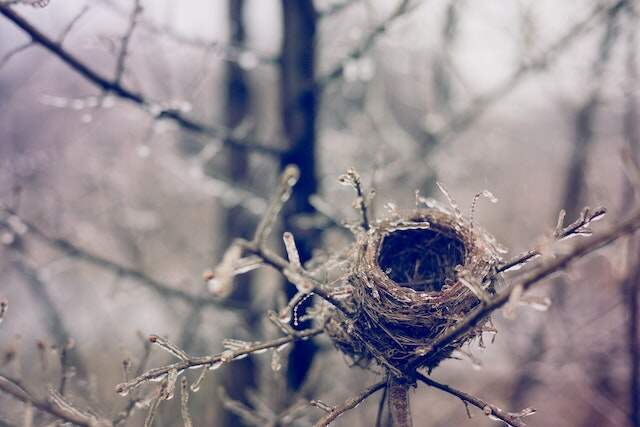
Protecting Bird Nests: Strategies to Prevent Abandonment
Tips for Minimizing Human Interference
Humans can often unintentionally disturb bird nests, leading to abandonment. There are several steps that individuals and communities can take to minimize human interference.
First, it is essential to educate people about the negative impacts of disturbing bird nests. Awareness campaigns and educational programs can be effective tools for promoting responsible behavior around nesting areas.
Another important strategy is to limit access to sensitive nesting areas. For example, constructing physical barriers around nests or posting signs that prohibit entry into nesting zones can help keep human disturbances at bay.
Additionally, limiting construction and development in critical bird habitat areas can help reduce the risk of nest abandonment due to habitat loss. It is crucial to practice responsible pet ownership near bird nesting sites.
Domestic animals like cats and dogs are natural predators and can easily harm or kill birds. Owners should keep their pets on a leash when in sensitive bird habitat areas or keep them indoors altogether during peak breeding season.
Strategies for Protecting Nests from Natural Causes
In addition to human interference, there are several natural threats that birds face during the breeding season. Predators such as snakes, raccoons, and foxes threaten eggs and young chicks in the nest.
Harsh weather conditions like heavy rain or wind gusts can also cause damage or destruction of nests. One solution is to install artificial nest boxes in safe locations around critical habitat areas.
These boxes mimic natural bird cavities and provide a safe refuge from predators and harsh weather conditions.
Additionally, providing sheltered feeding stations with nearby water sources reduces the need for birds to leave their nests frequently in search of food.
Another effective strategy is active monitoring of nesting sites by trained professionals or volunteers who can identify potential threats before they become problematic.
For example, regular checks for signs of predation or checking for egg viability can help prevent nest abandonment due to natural causes.
Conclusion: Protecting Bird Nests is Essential for Conservation
Preventing nest abandonment is a crucial step in protecting bird populations.
By minimizing human interference and providing shelter and protection from natural threats, we can ensure that nesting birds have the best chance of successfully rearing their young and contributing to healthy ecosystems.
It is up to everyone, from individuals to entire communities, to take responsibility for protecting bird habitats and respecting nesting areas.
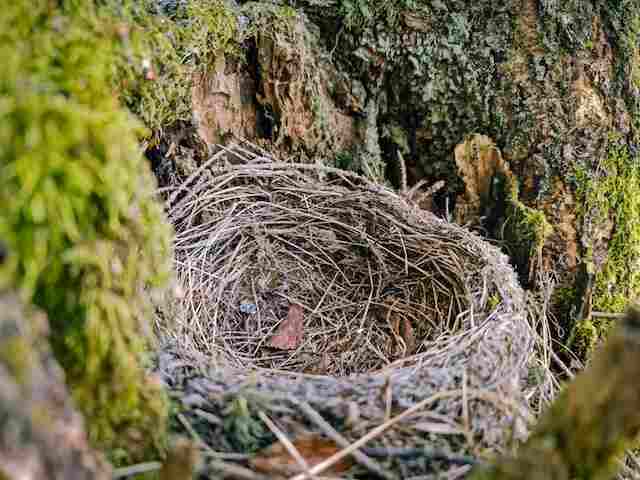
Examples of Successful Nest Protection Efforts
Conservation Organizations Making a Difference:
Several conservation organizations have made significant strides in protecting bird nests. One such organization is the Raptor Resource Project, which employs cameras to monitor nests and keep them safe from harm.
They focus on birds like eagles and ospreys that have been threatened by human activity and habitat loss.
The cameras also provide an opportunity for bird enthusiasts to observe the behavior of these creatures up close. The Cornell Lab of Ornithology is another organization that has worked hard to protect bird nests.
They use citizen science initiatives to gather data on nesting habits and patterns across different species. They also provide resources for individuals looking to protect nests in their own backyards.
Individual Efforts:
While organizations are making significant efforts towards nest protection, individuals can also make a difference. One story comes from a Reddit user, who found a hummingbird nest in his backyard and made it his mission to keep it safe from harm.
He used a variety of strategies, including placing mesh over the nest to prevent predators from getting inside. His efforts were successful, as he watched the hummingbirds hatch and grow before leaving the nest.
Another individual effort comes from a photographer, who noticed that plovers were building their nests too close to tourist areas at Hammonasset Beach State Park in Connecticut.
He began monitoring the situation himself by waking up early every morning before tourists arrived and guarding the area until park rangers arrived later in the day.
Saving Endangered Species:
Many endangered species rely on careful protection of their nests for survival.
The National Fish and Wildlife Foundation has played a significant role in protecting bird habitats across America, working with farmers to protect grassland bird nesting areas and collaborating with local communities to reduce human impact on nesting sites.
The Future of Nest Protection:
As the world becomes more conscious of the importance of protecting bird habitats, it is likely that we will see an increase in the number of organizations and individuals working towards this goal.
Technology will play a vital role, with cameras, drones and other tools helping monitor nests in real-time.
It is also important that people continue to respect nesting areas and take steps to minimize their impact on bird populations.
The conservation efforts we make today will have a lasting impact on the future of these creatures, and ultimately on the health of our planet.
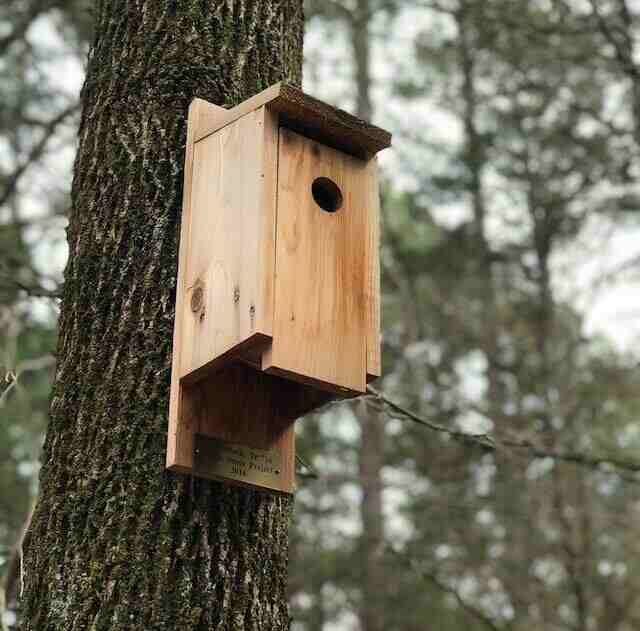
Conclusion
Recap of Main Points
In this article, we explored the topic of bird nest abandonment. We discussed the reasons why birds may abandon their nests, such as natural causes and human interference.
We also looked at the types of birds that are most likely to abandon their nests and the effects that this can have on bird populations and ecosystem functioning.
We discussed ways in which we can prevent nest abandonment through tips for minimizing human interference and strategies for protecting nests from natural causes.
It is clear from our discussion that bird nest abandonment is a serious issue that can have far-reaching implications.
When birds abandon their nests, they decrease their reproductive success and negatively impact ecosystem functioning.
In addition, habitat destruction and disturbance caused by humans can significantly contribute to nest abandonment rates.
Importance of Protecting Bird Habitats and Respecting Nesting Areas
The importance of protecting bird habitats and respecting nesting areas cannot be overstated. Birds play an essential role in maintaining healthy ecosystems, serving as pollinators, seed dispersers, and predators of insects.
When we disrupt natural habitats or disturb nesting areas, we not only harm individual birds, but also threaten entire species.
Fortunately, there are many things we can do to protect bird habitats and respect nesting areas. One simple step is to avoid disturbing areas where birds may be nesting or feeding during breeding season.
This means staying on marked trails when hiking or camping and keeping dogs on leashes in designated areas.
Conservation organizations are also playing a crucial role in protecting bird habitats by identifying critical nesting sites and working with landowners to implement conservation measures that benefit both birds and people.
While it may seem like a small thing to avoid disturbing a bird’s nest or feeding area while out hiking or camping, these small actions all add up in ensuring the ongoing survival of our feathered friends.
Let us all work towards respecting and protecting bird habitats, so that we can continue to enjoy the beauty and diversity of our avian neighbors for generations to come.
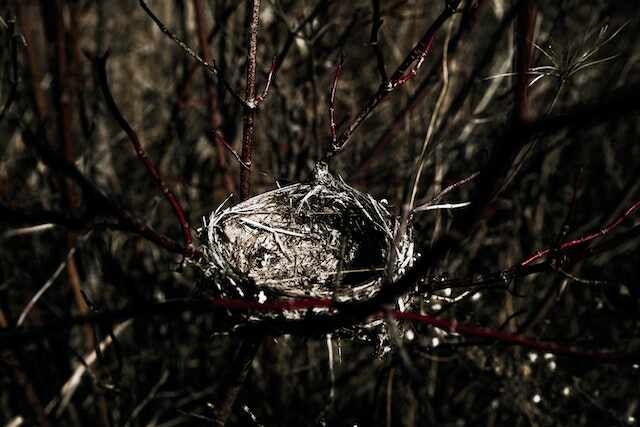
FAQs: Why Birds Abandon Their Nests?
Why do birds abandon their nests?
Birds may abandon their nests for various reasons, including predation, disturbance by humans or other animals, parasitic infestations, unsuitable weather conditions, or nest parasitism by other bird species. Sometimes, the nest may become compromised or damaged, forcing the birds to seek a safer location for breeding and raising their young.
What are the main predators of bird nests?
Common predators of bird nests include snakes, squirrels, raccoons, cats, and birds of prey such as hawks and owls. These predators often target eggs, nestlings, or even adult birds when they are vulnerable during nesting periods.
Can human activity cause birds to abandon their nests?
Yes, human activity can disturb nesting birds and lead to nest abandonment. Examples include constant noise, proximity of humans or pets to the nest, nest destruction during property maintenance, or frequent handling of the nest by curious individuals.
Do birds abandon their nests if touched by humans?
Not all bird species abandon their nests if touched by humans. However, it’s generally recommended to avoid touching nests to minimize disturbance. Some bird parents may abandon the nest if they perceive a potential threat or if their scent is altered by human touch.
Do birds return to abandoned nests?
In most cases, once a bird has abandoned a nest, it won’t return to it. Birds typically build new nests or find alternative nesting sites if their previous nest has been compromised or abandoned.
What is nest parasitism, and how does it affect nest abandonment?
Nest parasitism occurs when a bird species lays its eggs in the nests of other bird species, leaving the host bird to raise the parasitic chicks. If the level of parasitism becomes excessive, the host bird may abandon the nest to avoid raising unrelated offspring.
Can birds abandon their nests due to weather conditions?
Extreme weather conditions, such as heavy rain, strong winds, or prolonged heatwaves, can pose risks to nesting birds and their offspring. Birds may abandon nests if they deem the weather conditions unsuitable for successful breeding and survival.
Why do some birds abandon their nests after laying eggs?
Some bird species may abandon their nests after laying eggs if they perceive a threat or disturbance that jeopardizes the safety of their eggs. This behavior serves as a survival strategy to protect their genetic investment.
Do all bird species abandon their nests?
Not all bird species abandon their nests. Some birds, like albatrosses and penguins, exhibit high nest fidelity and return to the same nesting site year after year.
What should I do if I find an abandoned bird nest?
If you come across an abandoned bird nest, it’s best to leave it undisturbed. Birds may return to the nest in subsequent breeding seasons, or other bird species might repurpose it. Enjoy observing the nest from a distance without interfering with its contents.

